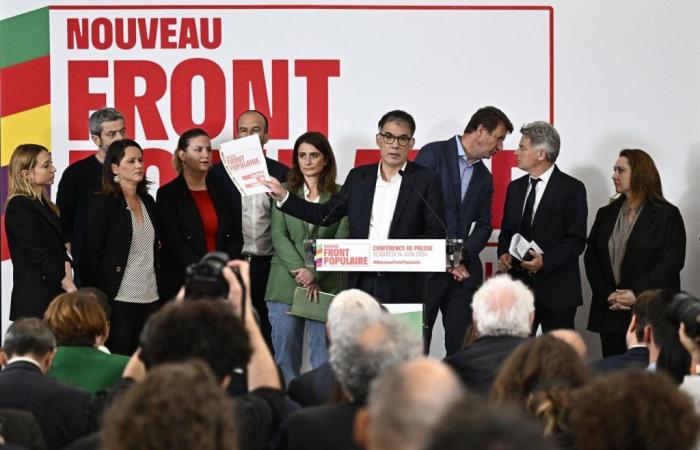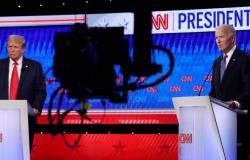The New Popular Front (NFP) project is above all economic and social. He also wants to be a “breakthrough program” claimed, much more to the left than that of François Hollande was in 2012. No less than 150 billion euros in new spending are planned. For an environmentalist negotiator, this choice of moving towards a “breakthrough program” ambitious was recorded the day after the dissolution.
This leftward shift is not unique to France: in the United States, Joe Biden is pursuing a more progressive policy than Barack Obama, and is letting deficits run wild. Emmanuel Macron himself has resorted heavily to public spending to respond to the health and then energy crises. But the model claimed by this New Popular Front is Spanish. For Parisian elected official Maxime Sauvage, one of the socialist negotiators, “Pedro Sánchez showed that it was possible to make an ambitious social policy, for example by increasing the minimum wage by 50%.”
The NFP project calls for strengthening public services and for the State to once again become the engine of economic and social life. These political choices will be costly. But for a negotiator, “we started from needs. The question of tax revenue came next”. The left supports tax increases, with a tax reform which will target wealth, make the CSG and income tax more progressive and will condition aid for businesses. Proposals put forward in recent years by left-wing economists, such as Thomas Piketty. The latter spoke of a “return of social and fiscal justice”. For Maxime Sauvage, “we demand this fiscal rearmament, when Emmanuel Macron impoverished the State by eliminating 50 billion euros in taxes on very ideological grounds”.
Economically, the program returns to classic Keynesian recipes, which had been abandoned in the 1980s and 1990s. Against inflation, the NFP even plans to restore the indexation of wages to inflation, abolished by François Mitterrand in 1983 during the turning point of rigor. “We are far from a decreasing project”, squeaks an environmentalist.
Because behind economic and social issues, the environmental program takes second place. The subject of nuclear power is, in particular, carefully avoided, at a time when Emmanuel Macron wants to relaunch the construction of power stations. A refusal to decide between environmentalists and anti-nuclear rebels and communists who support this energy. Societal questions are also less focused than in the 2022 program. The text is thus silent on the question of the end of life. For Hadrien Clouet, negotiator for La France insoumise, “if we talk first about the economic and the social, it’s because that’s where the emergency lies.”
A compromise born from express negotiations
If the negotiators quickly agreed on the idea of a project of rupture in economic and social matters, other aspects of the “legislative contract” were more hotly debated. With the constraint, very short deadlines: five days to draft a project for five years, while debates had been lively in recent months between left-wing forces, particularly on anti-Semitism or Gaza. Because, unlike countries where the election is proportional, the two-round majority vote requires French parties to form an alliance before the vote.
In 2022, the conditions of the alliance had been dictated by the Rebels. This time, the good score of the Glucksmann list in the Europeans justified a rebalancing. The main thing was played out between PS and LFI negotiators, which also explains the predominance of social issues. The PS thus imposed not starting from the 2022 Nupes program.
This contract made it possible to agree on several points and to clarify recent controversies. “This explains why our program is much longer than those of Renaissance or the RN”, justifies a socialist framework. Because the negotiators first discussed the angry subjects: anti-Semitism, Gaza, respect for European treaties and the war in Ukraine.
Concerning anti-Semitism, several comments made by the Insoumis have lastingly damaged the image of the Nupes. The socialists insisted on this subject. The fight against racism and anti-Semitism is the subject of an entire page of the program. At the request of the Insoumis, the fight against Islamophobia also appears there, at the same level. Gaza is also the subject of a full page. Here too, the compromise is the result of close negotiations. A concession made by the rebels, the project thus qualifies the Hamas massacres as “terrorists”.
The other divisive international subject is the war in Ukraine. The text evokes the “delivery of necessary weapons” to Ukraine and support for “the integrity of its borders”. The proposal to gradually leave NATO, which appeared in the 2022 Nupes program, has disappeared. Another development: two years ago, the project talked about not respecting certain European rules. At socialist demand, this notion of radical disobedience to European treaties has disappeared, even if the New Popular Front “wants to refuse the budgetary pact as well as competition law when it calls into question public services”. Desires which would complicate relations with the European Commission, while the latter has just initiated the first stage of the excessive deficit procedure against France.
The sustainability of a disruptive project
The rest of the program is made up of measures often resulting from the work of the Nupes intergroup of the National Assembly. For the rebellious Hadrien Clouet, “this project is the common heritage of the left. This is what brings us together. There is nothing that we would not have signed, that we cannot assume. » For the political scientist Rémi Lefebvre, “If the program is not so original, that is not what is decisive in mobilization. The programmatic negotiation served to create a balance of power between the groups and to neutralize certain criticisms addressed to the ex-Nupes and its components. » The program is first and foremost a means of justifying the union and launching the campaign.
And what ” legislative contract » has allowed the left to unite, it will still be necessary to convince voters of its sustainability. Fiscal sustainability first. Political sustainability then, at a time when this union is already showing signs of fragility.
——
Previous unions of the left
2022. The New Ecological and Social Popular Union (Nupes) brings together LFI, EELV, the PS, the PCF and Génération-s. In the legislative elections, she presented a program of 650 measures, including the freezing of prices, the minimum wage of €1,500 or the return of retirement to 60 years old.
1997. The plural left brings together the PS, the Greens, the PCF, the Left Radicals and the Citizens’ Movement, of Jean-Pierre Chevènement. Built urgently after the dissolution of the Assembly by Jacques Chirac, it will implement the 35-hour week and the creation of “youth jobs” once in power.
1972. The PS, the Communist Party and the Left Radicals sign a “common program of government”, which will serve as the basis for François Mitterrand’s proposals for the 1981 presidential election. Among them: the abolition of the death penalty, the majority at 18, nationalizations and the 39-hour week.
Find, as soon as they are officially published, the results of the 1st round of the 2024 legislative elections, municipality by municipality






